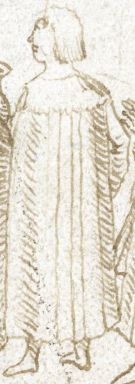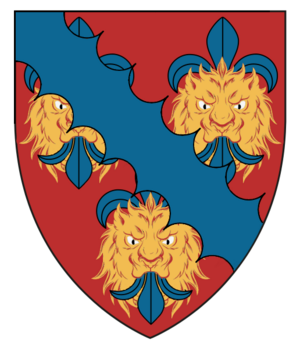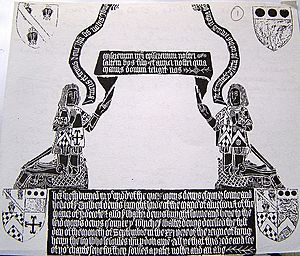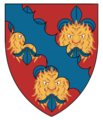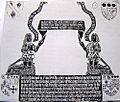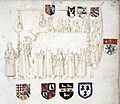Hugh Denys facts for kids
Hugh Denys (born around 1440, died 1511) was an important person in the royal courts of King Henry VII and his son, the young Henry VIII. Hugh Denys lived in Osterley, Middlesex, England. He held a special job called "Groom of the Stool" for King Henry VII. This made him one of the King's closest friends and advisors. His job grew to include managing the King's personal money, which was kept in a part of the palace called the Privy Chamber. Over time, this department also started to control the country's money policies. This meant Hugh Denys played a key role in King Henry VII's financial plans.
Contents
- Early Life and Family
- Marriage to Mary Ros
- Groom of the Stool: A Powerful Royal Job
- The King's Secret Money System
- Hugh Denys: A London Citizen
- Jobs at Windsor Castle and Other Roles
- Royal Payments and Gifts
- Queen Katherine of Aragon's Coronation
- Manors Held by Hugh Denys
- Corrodies: Royal Pensions
- Death and Burial
- Hugh Denys's Will
- Changes to Hugh Denys's Bequest
- Connection to a Famous Poet
- Images for kids
Early Life and Family
Hugh Denys was likely born around 1440 in Olveston, Gloucestershire. He was the second son of Maurice Denys, who was the lord of the manor of Alveston. His mother was Alice Poyntz. The Denys family had lived in Gloucestershire since 1380. Because Hugh was a second son, he didn't inherit much land or wealth from his family. This is shown by a small crescent moon on his family's coat of arms, which means he was a younger son.
Marriage to Mary Ros
Hugh Denys made a very good marriage to Mary Ros. She was the only child of Richard Ros, whose family was very important. Mary's uncle, Thomas de Ros, was a strong supporter of the Lancastrian side during the Wars of the Roses. He was later executed in 1464. Mary's family had many connections to powerful noble families. Hugh and Mary did not have any children together. After Hugh died, Mary married again to Sir Giles Capel.
Groom of the Stool: A Powerful Royal Job
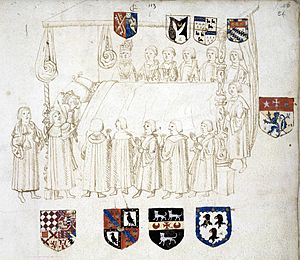
The job of "Groom of the Stool" made Hugh Denys the King's closest helper. At first, this job involved helping the King with his personal needs, like getting dressed and using the toilet. The word "stool" comes from an old word for a chair. This job meant Hugh was always near the King. Because of this closeness, he became a trusted advisor. Other courtiers often feared his influence and wanted to stay on his good side.
By the time Henry VII was King, the Groom of the Stool was a very important person. Hugh Denys was a wealthy gentleman married to a noblewoman. He owned several large estates. It seems his role changed during Henry VII's reign. Hugh Denys gained a lot of money later in life. This money might have come from his various jobs collecting taxes and duties for the King. This shows how the Groom of the Stool's job grew to include managing royal money.
The King's Secret Money System
The King, Henry VII, set up a new way to handle his money in 1493. It was called the "Privy Chamber" system. Hugh Denys became the main officer of this new department. He controlled who could see the King and was in charge of the King's daily needs. Denys also became the King's personal treasurer, managing an account known as the "Privy Purse."
In the last years of Henry VII's rule, the King became very focused on collecting money. He used a system of "bonds" and "recognizances." These were agreements where people had to pay fines for real or even made-up offenses. They paid some money right away and promised to pay the rest later. This meant people were often at the King's mercy. A special group called the Council Learned in the Law enforced these rules.
In 1508, Hugh Denys became even more central to this system. The King wanted to collect even more money from everyone. He created a new job called "Surveyor of the King's Prerogative." This person was in charge of making sure the King's rights to collect money were strictly enforced across the country. Local officials were appointed to help.
This new system was like a secret way for the King to collect taxes without asking Parliament. The money collected was paid directly to Hugh Denys. It was like a private "slush fund" for the King. This money was often paid at the King's private homes, like Wanstead Park, which Denys was in charge of.
Hugh Denys then used this money to buy large properties, like manors. He held these properties as a "bare trustee" for the King. This means he owned them legally, but the King was the real owner. The King trusted Denys completely with these secret funds. This system helped the King get money directly from fines and investments, without needing Parliament's approval.
Hugh Denys: A London Citizen
Hugh Denys was also a citizen of the City of London. He was a member of the Grocer's guild. This suggests he might have worked in business before he started working for the King.
Jobs at Windsor Castle and Other Roles
Hugh Denys also held the job of Verger of Windsor Castle. A Verger's duty was to carry a special rod or staff in front of important people, especially the King during ceremonies like the annual Garter Ceremony.
After King Henry VII died in 1509, Hugh Denys continued to work for the new King, Henry VIII. He was an "Esquire of the Body," which was a standard courtier role. He also held several jobs related to collecting taxes and duties:
- Gauger in Bristol: Measured goods that were taxed, like alcoholic drinks.
- Ulnager in Oxford and Berkshire: Checked the quality of wool cloth and collected taxes on it.
- Garbler of London: Likely involved in checking goods for quality or collecting duties.
- Usher at the Receipt of the Exchequer: This person was like a doorkeeper, letting local officials present their financial accounts to the King's treasury.
These jobs show how Hugh Denys's role grew from managing palace money to dealing with national taxes and finances. He was deeply involved in the King's financial system.
Royal Payments and Gifts
Hugh Denys also received fines for the King's Silver, which were payments made to the King's treasury. He received these payments between 1505 and 1508.
He was also involved in a payment for a musical instrument. In 1502, Queen Elizabeth of York (Henry VII's wife) paid Hugh Denys to reimburse him for paying a "stranger" (foreigner) who gave the Queen a "pair of clavycordes." These were early keyboard instruments, possibly some of the first imported into England. The payment was quite generous, showing the Queen's appreciation.
Queen Katherine of Aragon's Coronation
In June 1509, Hugh Denys's wife, Mrs. Denys, was listed as a "Gentlewoman of the Queen's Chamber" for the coronation of Queen Katherine of Aragon. She received special fabric for gowns and coats, along with other important people in the Royal Household. Hugh Denys himself was listed as an "Esquire for the Body" for the occasion.
Manors Held by Hugh Denys
Towards the end of his life, Hugh Denys bought several large estates called manors. He likely held these for the King's "Privy Purse" (secret money fund). A "bare trustee" holds property for someone else without a written agreement, relying only on trust. Since Hugh Denys was not born very rich, it's thought that these properties were bought with the King's money. The King would have trusted Denys completely with these investments. Manors were like companies back then, generating income from tenants and farms. The profits would go directly to the King's Privy Purse, managed by Denys.
Osterley Manor
Denys bought the manor of Osterley in Middlesex sometime after 1498. This land later became the site of the famous Osterley Park. After Denys's death, this manor went to Syon Abbey, a religious institution with royal connections.
Wyke Manor
Hugh Denys likely bought Wyke manor at the same time as Osterley. Like Osterley, it also went to Syon Abbey after his death.
Purleigh Manor, Essex
Hugh Denys owned Purleigh Manor in Essex. He left this manor to his nephew, John Denys. This was a way to help his nephew, who was a younger son and didn't inherit much. Later, this manor's income was used to support Magdalene College, Cambridge.
Wallasea Island
Hugh Denys also had connections to Wallasea Island in Essex, located near his Purleigh manor.
Shenley, Buckinghamshire
In 1506, Hugh Denys and his trustees bought lands at Shenley for £500 from Edmund Grey. This was a very large purchase. One of the trustees was Edmund Dudley, who was part of the King's "Council Learned in the Law," which collected fines for the King's secret fund. This suggests Shenley was also bought with the King's money.
Portpool Manor (Gray's Inn) Holborn
In 1506, Hugh Denys also bought Gray's Inn (then called Portpool Manor) in London. He used a group of ten trustees, including many of Henry VII's close financial officers. Gray's Inn later became one of the famous Inns of Court for lawyers. This purchase also seems to have been an investment of the King's secret funds.
Corrodies: Royal Pensions
Hugh Denys also held "corrodies." A corrody was like an annual payment or pension from a religious house (like a priory or abbey). Kings often used these as a way to reward their loyal servants.
Tywardreath Priory, Cornwall
Hugh Denys received payments from Tywardreath Priory in Cornwall. After he died, King Henry VIII granted this corrody to another courtier, John Porth.
Bury St. Edmunds Abbey
Denys also held a corrody from Bury St. Edmunds Abbey. After his death, this payment was given to William Gower, another royal servant.
Death and Burial
Hugh Denys died on October 9, 1511. He was buried at Sheen Priory, which was close to the King's Palace of Richmond. Sadly, his grave and monument were destroyed after the monasteries were closed down years later.
Hugh Denys's Will
In his will, Hugh Denys left the manors of Osterley, Wyke, and Gray's Inn to Sheen Priory. This was to help support the Chapel of All Angels at Brentford End and to create a hospital connected to it. He wanted the foundation to be called "The Chapel & Almshouses of Hugh Denys." The priests there were to pray for King Henry VII, John Somerset (a previous owner of Osterley), and Hugh Denys himself. Poor men living there would receive weekly payments and fuel.
It took five years for his trustees to get the King's permission to transfer these manors. There were some legal issues, as it was found that Gray's Inn might have belonged to the Crown before Denys owned it.
Changes to Hugh Denys's Bequest
Transfer to Syon Abbey (1530)
In 1530, for easier management, Sheen Priory transferred the manors of Osterley and Wyke (from Hugh Denys's will) to Syon Abbey. Syon Abbey was a nearby nunnery. Gray's Inn, however, stayed with Sheen Priory.
Dennis Benefaction at Magdalene College, Cambridge (1543)
After the monasteries were closed, the income from Purleigh Manor (which Hugh Denys had left to his nephew John Denys) needed a new purpose. John Denys's son, Hugh Denys of Pucklechurch (named after his great-uncle), asked Parliament to transfer this money to Magdalene College, Cambridge. The college was being re-established at the time.
This led to the creation of the "Dennis Benefaction" in 1543. Part of this money was used by the college, and some was used to create two special fellowships (like scholarships) called the "King's Fellows." This was one of the first gifts the college received. Today, the "Dennis Benefaction" is part of the college's general scholarship fund, though its value has decreased over time due to inflation.
Connection to a Famous Poet
It's possible that Hugh Denys of Pucklechurch's son, the poet John Dennys (died 1609), studied at Magdalene College, Cambridge, thanks to his family's gift. John Dennys became famous much later for his poem "The Secrets of Angling," which was the first poem about fishing in English. He was a very educated man, and it's likely he gained his knowledge at Magdalene College because of his family's connection to the "Dennis Benefaction."
Images for kids


